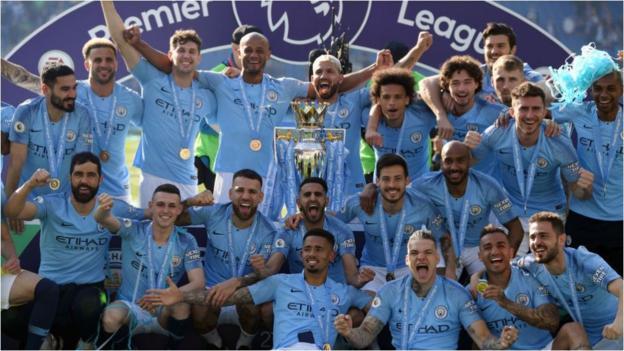Coronavirus pandemic set to cost Premier League clubs £1bn in 2019-20 – Deloitte

Premier League clubs face a £1bn reduction in their revenues in 2019-20 because of the coronavirus pandemic, says financial services firm Deloitte.
The 20 English top-flight clubs had a combined revenue of more than £5bn for the first time in 2018-19.
But this season has been on hold since March, and the 92 remaining matches will be held behind closed doors.
And Deloitte’s Dan Jones expects «significant revenue reduction and operating losses» in European football.
Deloitte says £500m of the reduction for Premier League clubs – in rebates to broadcasters and a loss of matchday revenue – will be «permanently lost», with the remainder «deferred» until 2020-21 if this season and next are completed.
Manchester United said last month that the pandemic had already cost them £28m – but they expect the final figure to be far higher.
Key findings from Deloitte’s annual review of football finance
- The Premier League clubs’ revenues rose to £5.2bn in 2018-19 – up 7% on the previous year.
- The ‘big five’ European leagues (England, Spain, Italy, Germany and France) generated a record £15bn in revenue – up 9%.
- Premier League clubs’ aggregate operating profits fell 5% to £824m.
- The 92 Premier League and Football League clubs generated a record £6.2bn in revenue, and contributed £2.3bn in taxes to HMRC (2017-18: £2.1bn).
- Premier League clubs made combined pre-tax losses of £165m.
What is the picture in the Football League?
All three divisions of the English Football League – the Championship, League One and League Two – achieved record revenues in 2018-19, topping a combined £1bn for the first time.
But Championship clubs lost a combined £300m, with a ratio of players’ wages to turnover of 107%.
Deloitte believes teams in the division should work to a salary cap of 70% of revenue to ensure their survival.
Jones said: «You’ve got 107% of revenue going out on wages. You can see the problem looming.
«A salary cap is a blunt instrument, but if you can only spend 70% of revenue on salary, and applied that in 2018-19, you take £300m out of the wage bill and wipe out the losses.»
Bury – then in League One – were expelled by the EFL in August after a takeover bid collapsed, but Jones says Leagues One and Two were «systemically in a better place than 10 years previously» prior to the coronavirus pandemic.
Both divisions’ regular seasons have been brought to an early conclusion, with the positions decided on a points-per-match basis, although the promotion play-offs could still take place.
An EFL spokesman said: «The EFL has been consulting with its member clubs for some time regarding potential changes to financial and sustainability regulations with the aim of improving the current position in all three divisions.
«These discussions, which commenced prior to the Covid-19 outbreak and have continued throughout the crisis, have included reviews of the divisional cost controls currently in place and the potential introduction of new measures such as salary caps and squad size limits. Discussions with clubs remain ongoing.»
More findings from Deloitte’s annual review of football finance
- The 72 Football League clubs earned revenues of over £1bn for the first time.
- Championship clubs generated record combined revenues of £785m in 2018-19 – a 5% increase from 2017-18.
- The wages/revenue ratio of English Championship clubs increased to a record 107%.
- League One clubs had their highest aggregate revenues (£191m) and League Two matched its previous record (£91m).


